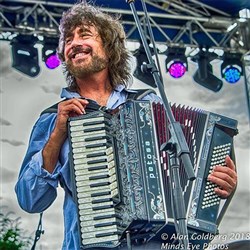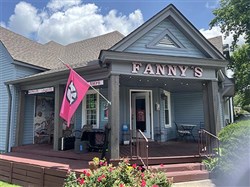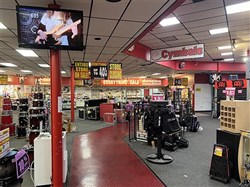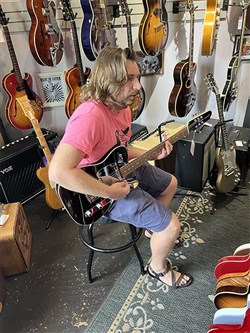VOL. 48 | NO. 22 | Friday, May 31, 2024
What pro pickers pick
By Lucas Hendrickson
Every June, the spotlight of the modern music-making world shines on Nashville and Middle Tennessee as both CMA Fest and Bonnaroo take their long-tenured turns on the summer festival forefront.
And every summer, an untold fraction of festivalgoers with talent, ambitious pickers, and performers with stardom in their eyes alight on the area to chase dreams of creating their own kinds of eras.
Sure, they all face the same kinds of questions anyone relocating anywhere comes up against: Where am I going to live? How am I going to make money? Where will I carve out my niche, make friends and craft a scene for myself?
But in Nashville, maybe more than any other city in the world, a significant number of newcomers will have this question:
Where am I going to find my favorite brand of flat-wound guitar strings?
Starting out: Big box or online?
The answer to that specific question, as well as many others dealing with the musical gear supply chain, grows both simpler and more complex as the realities of 21st century American and global economics come into play.
The emergence and sophistication of online retail has made the availability of goods of all types almost as simple as clicking a mouse. But the flooding of the zone by sponsored search returns and products of questionable origin and quality has made the reliability of what you’re going to receive and attempt to use much more suspect than it should be.
Fortunately for musicians in Nashville – both newcomers to the area and longtime working pros – there are still plenty of reputable brick-and-mortar locations available to solve a player’s gear acquisition puzzle, even as one of the bigger national names prepares to close its physical doors.
Sam Ash Music, the century-old family owned chain of music stores, announced earlier this spring that it was shutting down all of its locations, including the store in Madison. The Rivergate-area spot began its liquidation process in early May, but as of last week still had significant inventory, especially relating to higher-end guitars, amps and studio gear that had not yet been marked down more than 10%.
The realignment of music gear retail brought on by online-focused outlets such as Amazon, Sweetwater and Musician’s Friend has taken a toll on brick-and-mortar legacies such as Sam Ash and Guitar Center, which has three locations in the Midstate: Madison, Berry Hill and Cool Springs. Guitar Center faced its own pandemic-era challenges, filing for Chapter 11 bankruptcy in November 2020, but reorganized with renewed financing and strategic shifts involving both its online and physical operations.
Becoming that working pro
Fortunately for Nashville players of all levels, a tight-knit tapestry of shops – specializing in all kinds of instruments, pro recording gear, backline equipment, service, education and more – exists to support Music City’s music making habit.

Michael Webb, who plays anything with keys, heads to Corner Music when he needs help.
-- Photograph ProvidedThat’s something that comforts multi-instrumentalist Michael Webb, a longtime sideman, session player and touring stalwart, who knows he can readily put his hands on all the little things he needs to keep his performing and recording rigs up and running.
“If I can, I try to go to Corner Music first for, let’s say, electronic keyboards,” says Webb, much in demand for his keyboard, organ and accordion work. “Of course, you want to get your hands on a guitar, so Nashville is still the greatest town in the world to buy guitars or mandolins or anything with strings.
“So anything like that, me, personally, and most people I know, you get your hands on it, you don’t order a guitar from the mail,” Webb continues, “although in general, with the quality now that they’re all computer-lathed, it is a safer bet now than it’s ever been before.”
That’s not to say Webb doesn’t dip into the convenience of point-and-click gear acquisition.
“If a Musician’s Friend, for instance, is running some holier-than-thou sales, yeah, I’ll order it and ship it right to my house. Because sometimes they’re just able to do it faster and cheaper,” he says.
But the human touch of experience and local knowledge is important to music makers in the Nashville area, and locations like Corner Music, which opened in its original space in 12 South in 1976 and relocated to a larger facility on Dickerson Road in 2018, and its offshoot store Fork’s Drum Closet, which changed ownership and location, also in 2018.

Fanny’s House of Music in East Nashville (1101 Holly Street), provides shoppers a different experience than the “big box” retailers, but still a great selection of quality instruments.
-- Photos By Lucas Hendrickson | The Ledger“From a drummer’s perspective, Nashville’s in a really great spot now because we’ve literally got multiple dedicated drum shops, and they all do slightly different things,” says Steve Ebe, who moved to Nashville from Memphis in the early ’90s with the band Human Radio and now splits his time teaching and gigging with bands such as The Long Players, Guilty Pleasures and Jason Ringenberg’s solo projects.
“I’ve been affiliated with Forks ever since 1996 and right now I teach four days a week online and I do one morning and a couple of other days at Forks,” Ebe continues “Forks is now owned by a guy named Steve Maxwell, who had a drum shop in New York City, still runs one in Chicago, and also owns the Craviotto drum company, which moved from California into Nashville a couple of years back.
“They’ve got a really nice mix of brand-new gear and they keep a lot of stuff, all the supplies in stock and they keep the prices pretty fair, I think, but they also have more used gear than they used to carry. So that gives people a lot of choices, especially if they’re looking for a first drum set.”
Finding the elusive deal
Even working pros like Webb and Ebe, with all the dialing-in of equipment required for playing, performing and producing, still like to browse the shops, looking for the next thing to add to their musical arsenal.
“Generally, if I do that, I tend to go over I like Fanny’s in East Nashville,” Webb says. “They have just enough that doesn’t overwhelm me and they always have something pretty cool and I’m comfortable there.
“They also always have a line on somebody that’s really high quality for dropping their guitars in for repairs,” Webb notes. “There’s a lot fewer, ‘drop your guitar off and they fix it on-site’ places anymore.”

Sam Ash Music in Madison began its liquidation sale in early May, but deals are still available.
As gear-intensive as drumming can be, Ebe’s constantly reworking his home space. “My entire garage has been changed around to just be drum storage,” he says. “So I’ve got big shelves like they have at Home Depot, and they’ve all got drums stacked up in cases there.
“But I like to go shopping because it is fun for me and I’m good at it,” he laughs. “Also, whenever I know a student is looking for something, I’ll go shopping for them. Right now, I’ve got a kid who’s ready to upgrade to a professional kit, but he doesn’t have a ton of money, so I’m watching for that killer deal, a used Gretsch kit from the ’70s or something. It’ll show up. It just isn’t easy to find. You just gotta keep looking.”
The added benefit of such a music-focused city is a shared vocabulary with other professionals who, in another circumstance or location, might just give back a quizzical look. “I needed to get a mandolin, because I didn’t want to take my Flatiron (mandolin) on the road,” Webb says. “I was worried about it, I didn’t wanna mic it or anything, so I bought a Kentucky brand mandolin that if it got destroyed, I wouldn’t cry about it.
“I went to (8th Avenue South-based) Carter (Vintage) and said, ‘Whatever (legendary player) Sam Bush has in his mandolin for the pickups, put it in there.’ That’s all I had to say, right? Because we’re in Nashville and it’s kind of what I love about this town.

Allan Fine test plays a 2020 custom Fender Telecaster at Fanny’s House of Music in East Nashville.
-- Photo By Lucas Hendrickson |The Ledger“We are really spoiled in terms of everything, because we have engineers, gear, players, singers, writers, bus drivers, lighting, cartage, space to rehearse and in a really small area compared to L.A. or New York,” Webb says. “Granted, here’s one of the good things about Guitar Centers: they are kind of everywhere. But if we’re in my hometown of Columbia, Kentucky and somebody’s got us doing a show and we realize I don’t have the (guitar) capos, you’re out of luck. You can’t just go into Walmart and get guitar cables or things like that.
“We take it for granted in Nashville because they’re around every corner because we have so much music.”